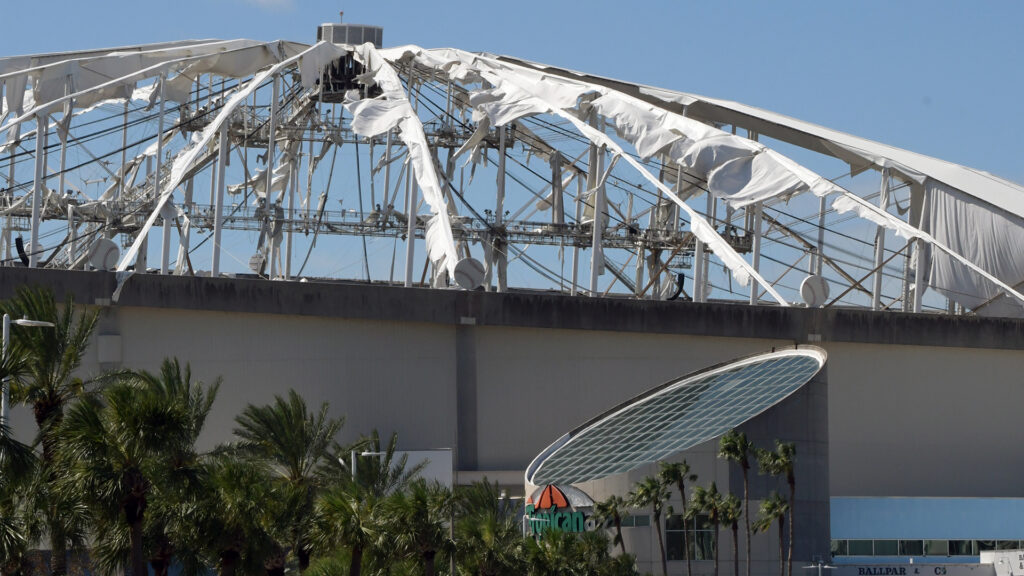By the Tampa Bay Times Editorial Board
Tampa Bay residents are salvaging what they can. Cities and counties are still collecting mountains of storm debris. Businesses along the Gulf Coast and even inland are deciding how, when and whether to rebuild. The fallout from the 2024 Atlantic hurricane season will impact this region for years. That’s why it’s essential to start figuring out now how to handle these tropical downpours in the future.

Hurricanes Debby (Aug. 5), Helene (Sept. 26) and Milton (Oct. 9) made landfall in Florida this year tens, if not hundreds, of miles from Tampa Bay. However, the punishing winds and torrential rain from these systems caused extensive flooding throughout the region, including in numerous communities in Pinellas and Hillsborough counties that had never flooded before.
A recent Times examination of how this region fared (and failed) during these storms pointed to many of the predictable suspects, from an aging and insufficient stormwater system to overbuilding in places that left homes and businesses vulnerable. It also exposed how government agencies are lagging in confronting the growing impacts of climate change, as extreme weather becomes more common and imperils fast-growing areas.
Now, with local governments undertaking a post-disaster review, it’s worth highlighting a few key points as area leaders plan.
Hardening we can afford
Milton dumped 18-20 inches of rain in Pinellas County over 24 hours and nearly as much over the same period in Hillsborough, in what a National Weather Service meteorologist described as at least a 1-in-500-year rainfall event. Most regional stormwater systems, however, are built to handle only a 1-in-25-year storm.
While there’s work to do, local taxpayers cannot afford and should not expect a flood control system that can handle any event. Expanding capacity is fine, but any stormwater plan must include many things, from a greater emphasis on capturing runoff at its source to new containment strategies that treat rainwater as a resource, not merely a public nuisance or property risk.
Start with the basics
The best solutions often start with the cheapest, most straightforward fixes. Local governments need to prioritize basic maintenance, whether that’s more regular cleaning of storm inlets and drains or better management of water retention ponds. New retention areas, improved curbing and other costlier but routine investments would help.
But improving an existing system’s ability to move stormwater quickly from pooling on streets and residential areas is critical to better protecting lives and property. This is an area where citizens can help, whether that’s neighborhood groups volunteering to clean storm drains or residents simply not blowing lawn clippings and fertilizer into the street, where it inevitably heads to the drain’s inlet.
Smarter plan for growth
Much of the damage this year was payback for mistakes in addressing growth and climate for the past several decades. Area governments need to reexamine their land use policies to limit or further harden development in some flood-prone areas. Tampa Bay will continue to grow. But the secret will be in developing more dense, mixed-use communities that maximize stormwater and other infrastructure, leaving more of natural Florida to absorb storm-related impacts.
Editorials are the institutional voice of the Tampa Bay Times. The members of the Editorial Board are Editor of Editorials Graham Brink, Sebastian Dortch, John Hill and Chairman and CEO Conan Gallaty.
This opinion piece was originally published by the Tampa Bay Times, which is a media partner of The Invading Sea. Banner photo: A Tampa street still flooded four days after Hurricane Milton. (Liz Roll/FEMA, via Defense Visual Information Distribution Service).
Sign up for The Invading Sea newsletter by visiting here. To support The Invading Sea, click here to make a donation. If you are interested in submitting an opinion piece to The Invading Sea, email Editor Nathan Crabbe at ncrabbe@fau.edu.



